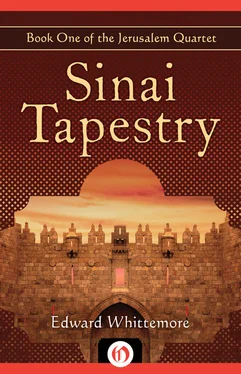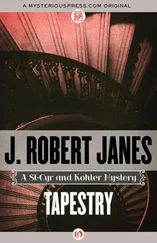When he lost the use of one hand he switched his reed pen to the other and went on writing, letting the warped hand heal, something else he had taught himself in Jerusalem because he knew the work in the cave would surpass any man’s endurance unless he could write with both hands.
From the wandering Jebeliyeh he received a little food and water as the Greek monks had ordered, placed in a small pot at the foot of the mountain where he could retrieve it every third day or so, unobserved in darkness. For although the monks honored the crazed Armenian’s desire to see and be seen by no man, they also knew that God with His manifold duties might not always remember to replenish the suffering hermit’s diet of worms and locusts.
From first light to last he bent over the sheaves of his thickening manuscript, unaware of the incessantly chewing sand flies and the swarms of insects that rose to feed on his frail body at dusk, so absorbed he no longer blinked when an ant crossed his eyeball, his act of creation witnessed only by an occasional ibex or gazelle or mole, a wildcat or jackal or leopard, the timid and ferocious beasts who came to stare at the unfathomable patience of this fellow animal, while in the invisible sky beyond the mouth of the cave eagles swooped through the thousand-year lives granted them in the desert and thin flights of quail and grouse and partridge passed briefly in their seasons.
Until one morning Wallenstein found himself raving about legions of locusts as large as horses, wearing lurid crowns and iron breastplates, atrocious beasts with the hair of women and the teeth of lions and the tails of scorpions, relentlessly charging the cities on the plain to trample and poison and dismember transgressors in the valley of his Book of Revelations, blood running in rivers in the name of God.
And reverently one evening he lifted his eyes from the riot of plague and slaughter to behold a great high mountain with a great city upon it, the holy Jerusalem descending from heaven amidst incandescent jewels.
And the building of the wall it was of jasper, he wrote in his stately fourth-century Greek, and the city was pure gold.
A few days later he made his final warning, saying that if any man ever took words away from this book of prophecy God would take him out of the book of life and out of the Holy City.
And then he wrote, The grace of our Lord Jesus Christ be with you all, Amen, and suddenly he found his enormous apocalyptic forgery at an end.
Wallenstein stared at the rags in his lap. He had turned the last sheet of parchment and his lap was empty. All at once he was frightened. He reached out and touched the walls of the tiny cave.
No more pages in the book of life? What place was this?
He gazed at the reed in his hand. How straight and beautiful it was and how grotesque the bits of skin and bone that clasped it. Crooked repulsive fingers. Why were they so ugly now when the slender reed was unchanged?
Wallenstein shuddered. The reed fell from his hand. He crawled out of the cave and squinted up at the mountain. The sun had just set. A mole was watching him with wide eyes. Humbly Wallenstein knelt and the mole asked him a question.
What have you done today for God?
Wallenstein bowed his head. He drew his rags around him in the dying light and his head slipped lower until his brow rested in the dust, where the answer was given.
Today in His name I have rewritten the universe.
And there he remained all night, not stirring, accepting the last hours he would know on Mt Sinai, the last lucid moments of his life as well.
What he had done he had done only for God, yet all the same he knew what would happen to him now.
At dawn he gathered up his materials. Once more the cave was as he had found it, small and bare and crumbling.
Wallenstein limped down the mountain toward the gate of St Catherine’s. The monks came running to appraise the wild hermit unseen in seven years, but when the gate was opened all but the older fell back.
What face was this? What body? No man could possess them. Had the soul already been taken up by God?
The older monks knew better. Meekly they bowed their heads and prayed as the abbot ordered the bells of the monastery to be rung in celebration. The bells pealed, the abbot stepped forward to address the twisted figure with the terrible face.
The task is done? You have found what you sought?
Wallenstein groped to find a voice men could understand. His contorted mouth opened and closed in agony. He made a harsh uneven sound.
Done.
The abbot crossed himself.
Then will you rest with us, o brother of the mountain? You have succeeded after all, you have accomplished what you set out to do. Nourish yourself now and let your wounds heal, and let us help you. It will be an honor to serve you, brother.
Wallenstein staggered. A jagged scar had appeared on the horizon of the desert, some indelible hallucination. He tried to wipe away the scar but his hand couldn’t reach it.
God’s creatures had done it, the ants in the cave crossing his eyes for seven years, tracing a path with their footprints. Each day the scar would grow more jagged until soon there would be no landscape at all and the scar would be all there was to see. How much time did he have? Weeks? Days?
You will rest with us? repeated the abbot.
One night, whispered Wallenstein. A cell for one night if you will.
The abbot crossed himself again. The hermit in front of him was clearly near death. He began to protest but the anguish in Wallenstein’s face stopped him.
As you wish, he murmured sadly. Will you be traveling then tomorrow?
Yes.
Where must you go?
Jerusalem.
The abbot nodded. Now he thought he understood. The hermit was taking his soul to the Holy City to relinquish it. Who knew? Perhaps his task wasn’t yet completed. Perhaps there was this last covenant he had made with God during his suffering on the mountain.
Jerusalem, he said softly. Yes I see.
That night while the monks slept Wallenstein’s forgery of the Sinai Bible found its way to the back of a dusty shelf in one of the storerooms of St Catherine’s. Most of the other books there were of little value, but not so insignificant that some future scholar would fail to examine them.
As for the original manuscript with its terrifying ambiguities, he was going to take that with him to Jerusalem, having no intention of destroying it. For although written by an anonymous blind man and an anonymous imbecile who had lost their way in the desert, hadn’t the great St Anthony also gone into the desert in search of the Word?
Yes, Wallenstein told himself, St Anthony had also done that. And if other poor souls had made the same attempt and been confused by ghosts and mirages and succumbed to untenable visions, still their work couldn’t be destroyed for they too had tried, only the Word as they heard it had been wrong. So it had never entered Wallenstein’s mind to destroy the original manuscript, a work of God’s like any other. Rather it would be laid to rest in a dry dark grave just as his own once blank parchment had been before it.
And given his humility it also never occurred to Wallenstein that in the course of his long sojourn in a desert cave, following the example of St Anthony, he might have performed a monastic feat equal in magnitude to St Anthony’s and thereby become a new St Anthony.
Or simply the real St Anthony, a hermit who knew no era in his love for God.
Or what could have been stranger still, that in the course of his trial of fatigue and hunger, tormented by the glaring sun and lonely stars and yet surviving in his cave, he had in fact relived the lives of those two unknown wanderers whose recitations in dusty waysides had finally led them to the foot of the mountain three thousand years ago.
Читать дальше












